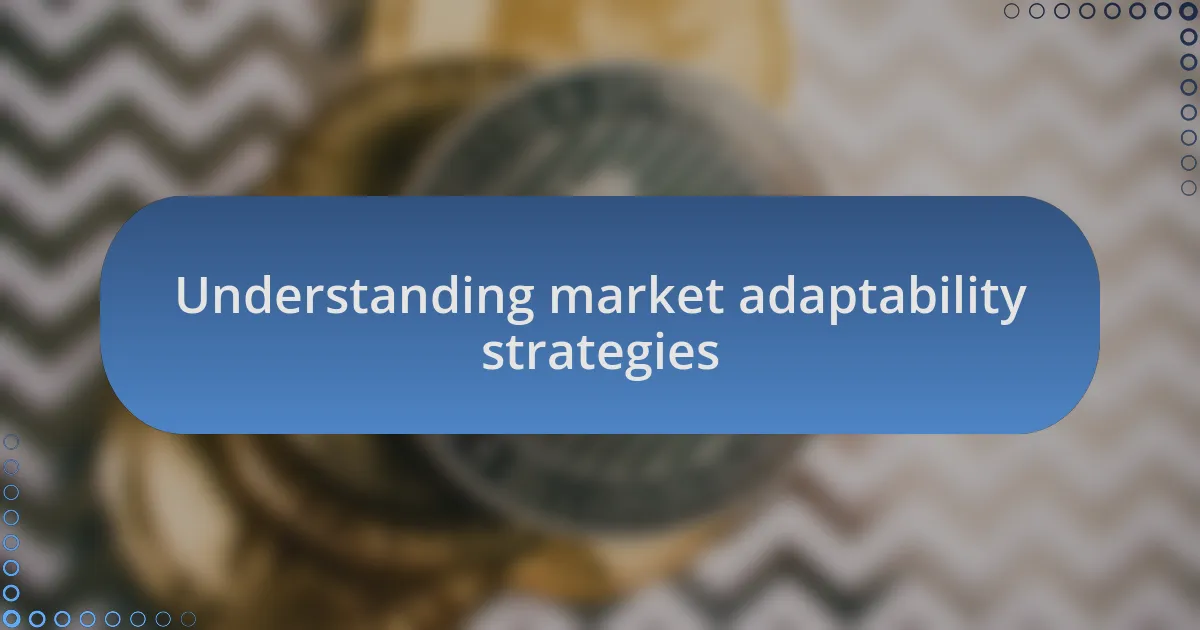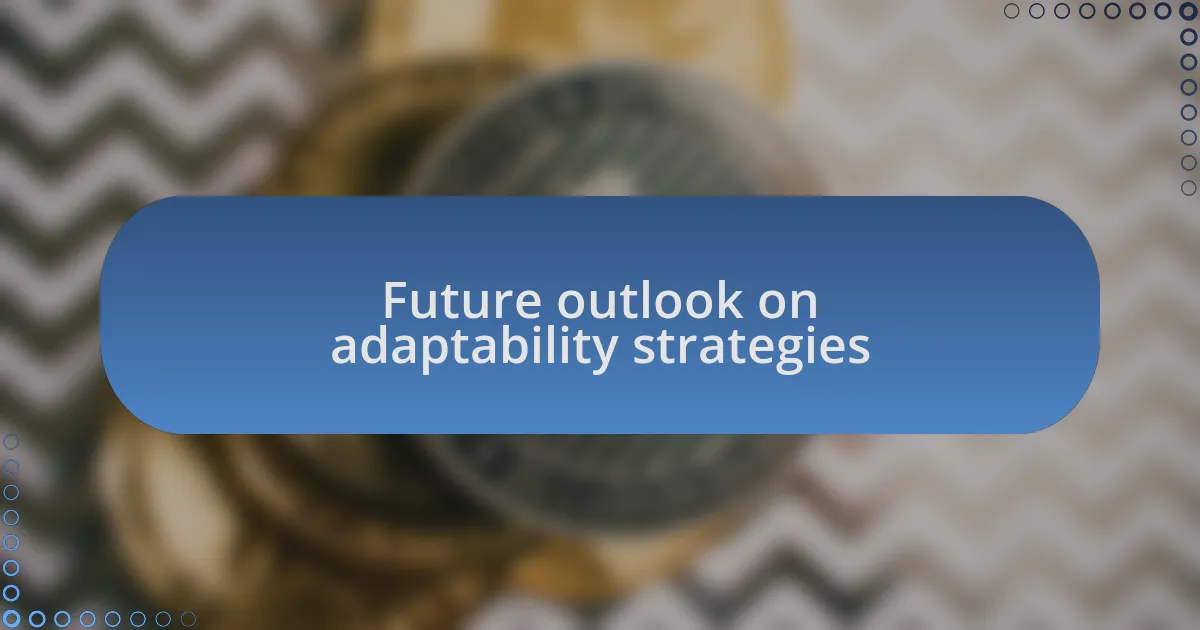Key takeaways:
- Market adaptability involves embracing change and using analytical tools to stay ahead of trends, fostering resilience in volatile environments.
- Effective analysis engines prioritize speed, accuracy, and user-friendliness, enabling traders to make informed decisions and enhancing overall trading success.
- Diversifying information sources and maintaining a flexible trading plan are essential strategies for adapting to market fluctuations and new opportunities.
- Listening to community sentiment and being resilient amid volatility can provide critical insights for strategic adjustments and learning opportunities.

Understanding market adaptability strategies
Market adaptability strategies are essential for navigating the ever-changing landscape of cryptocurrency. From my observation, these strategies revolve around embracing change and staying informed. For instance, I once witnessed a small crypto startup pivot from a niche market to a broader audience after analyzing user feedback. This not only boosted their user base but also provided invaluable learning opportunities.
Have you ever felt the urgency to shift your approach when the market trends suddenly change? I remember grappling with a similar situation during a downturn. The key was not just to react but to anticipate shifts by utilizing analytical tools that track market movements. Being proactive rather than reactive fosters resilience and allows businesses to respond effectively to new trends.
Understanding these strategies means recognizing the importance of flexibility and innovation. It’s about creating an environment where ideas can flourish, and rapid adjustments can be made. I often think about how some companies thrive by experimenting with new features or services, even in uncertain times. It’s a powerful reminder that adaptability can be a significant competitive advantage in the crypto space.

Key features of effective engines
Key features of effective engines are intrinsically tied to their ability to analyze data swiftly and accurately. I recall a time when I used a particular analysis engine that provided real-time insights during a significant price surge. The clarity and speed of the data allowed me to make quick investment decisions, illustrating how essential a robust engine is for navigating volatile markets. It’s no surprise that speed and accuracy become hallmark traits of any effective analysis tool.
Another critical feature lies in user-friendliness. I once struggled with an overly complex interface that made it difficult to extract actionable insights. This experience taught me how essential it is for an engine to provide an intuitive design that caters to both novice and experienced traders. When users can navigate effortlessly, they’re far more inclined to leverage the tool effectively, which ultimately enhances their trading success.
Finally, I believe that a strong community and support system amplify an engine’s effectiveness. During my early days in crypto trading, I found solace in user forums and FAQs that connected me with others facing similar challenges. These spaces foster valuable exchanges of information and tips, transforming a solitary journey into a more collaborative experience. An effective engine not only provides analytics but also nurtures a community that encourages continuous learning and growth.

Adapting to market trends
Adapting to market trends requires a proactive mindset. I vividly remember a time when I failed to recognize the rising interest in decentralized finance (DeFi) projects. By the time I adapted my strategy, I had missed out on significant gains. It made me realize how crucial it is to stay ahead of the curve; having the right tools and insights can mean the difference between opportunity and regret.
Market trends can be fleeting, and I often find myself pondering, “How can I ensure I’m not just reacting, but anticipating?” One instance that stands out is when I started following social sentiment indicators. They helped me gauge community interest in upcoming projects, giving me early warnings about potential price movements. This shift in my approach not only enhanced my profitability but also made me feel more connected to the market dynamics.
I’ve learned that flexibility isn’t just a strategy; it’s a mindset. Embracing change and continuously assessing market signals allows me to pivot when necessary. For instance, when I noticed an uptick in interest for green energy tokens, I adjusted my portfolio accordingly. I felt empowered, knowing I was making informed choices rather than simply following the herd. How do you stay adaptable in such a fast-paced environment?

Personal strategies for market adaptability
When it comes to market adaptability, I’ve found that diversifying my information sources has paid off immensely. A few months ago, I began tapping into various online forums and communities where traders were sharing their insights. By doing so, I not only gathered different perspectives but also discovered emerging trends that I might have overlooked otherwise. Isn’t it fascinating how collective knowledge can open up new avenues for exploration?
Another strategy I swear by is maintaining a flexible trading plan. On one occasion, I faced a sudden dip in a cryptocurrency I was heavily invested in. Instead of sticking rigidly to my initial plan, I quickly assessed the situation and decided to hedge my losses by reallocating a portion of my investment into a rising altcoin. This adaptability not only minimized my losses but also provided me with an unexpected opportunity to invest in a potentially lucrative project. How often do we cling to plans that no longer serve us?
Moreover, leveraging technology has become a game-changer in my approach to market adaptability. I remember the first time I experimented with automated trading bots. They helped me execute trades instantly based on pre-set criteria, allowing me to capitalize on market movements without emotional interference. Have you ever thought about how automation might streamline your trading strategy? Embracing such tools has truly transformed my trading experience, making it more efficient and less stressful.

Lessons learned from market changes
Listening to the market is one of the most important lessons I’ve learned from recent changes. During a significant market shift last spring, I noticed how rapid fluctuations were often accompanied by changes in community sentiment. By paying close attention to discussions in online groups, I could sense when fear or excitement was taking hold, allowing me to adjust before the crowd reacted. Have you ever thought about how sentiment can be a leading indicator of market direction?
Another key takeaway for me was the necessity of resilience amid volatility. I remember facing a major downturn, and instead of feeling defeated, I took a step back to reassess my emotions. This pause helped me realize that setbacks can present unique insights—sometimes what feels like a loss can propel you towards better decision-making. How often do we let fear overshadow potential learning opportunities?
Additionally, I’ve learned that experimentation is crucial in a tech-driven market like cryptocurrency. Last year, I took a leap and invested a small amount in a community-driven project that many were skeptical about. The risk was high, but it forced me to learn about evaluating emerging technologies. That experience not only broadened my understanding but also underscored the importance of being proactive when confronting new market trends. Isn’t it interesting how taking chances can lead to profound growth?

Future outlook on adaptability strategies
Future adaptability strategies must be rooted in flexibility and responsiveness. I remember a time when I hesitated to pivot my investment strategy in response to new data, and it cost me. As I reflect on that experience, I realize that embracing change has become crucial—those who adapt quickly are often the ones who thrive in this dynamic environment. What if being open to rapid adjustments is the key to long-term success?
Looking ahead, it’s clear that leveraging technology will be vital for adaptability. An example from my own journey involved utilizing advanced analytics tools to forecast market trends more accurately. This shift allowed me to make data-driven decisions rather than relying solely on gut feelings. Isn’t technology transforming how we navigate uncertainty in the crypto space?
Furthermore, collaboration within the crypto community will be essential for shaping effective strategies. I recall engaging with a diverse group of investors during a volatile market phase. Sharing insights and experiences helped many of us recalibrate our approaches, proving that collective wisdom can lead to innovative solutions. How can we harness this community spirit to enhance our adaptability in the ever-evolving landscape?